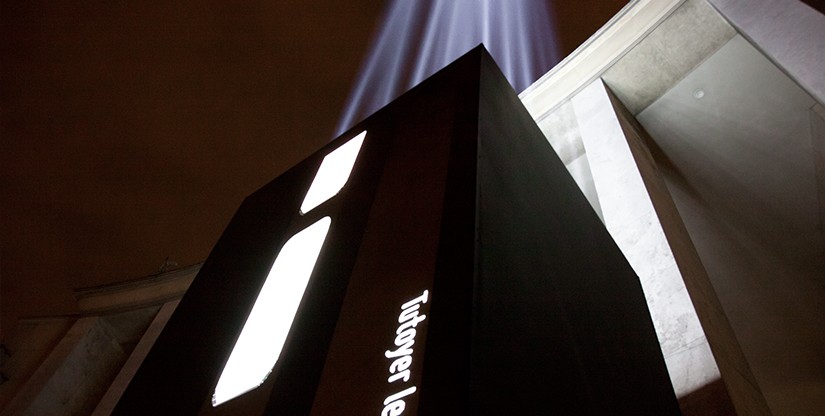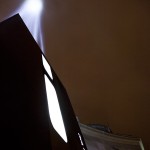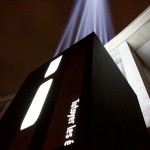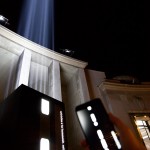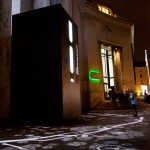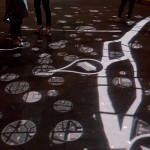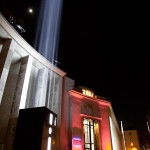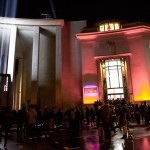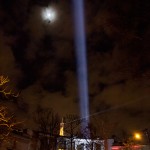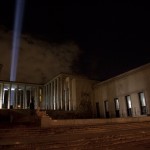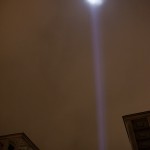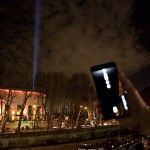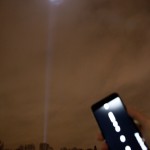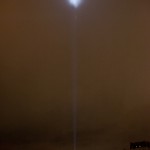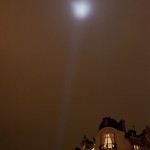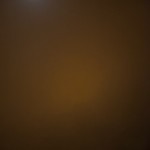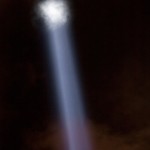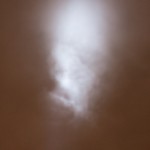An interactive public installation with smartphones, Palais de Tokyo, Paris, February 2016
Surexposition/Overexposure (v.2) is an interactive work bringing together a public installation and a smart phone application. On an urban square, a large black monolith projects an intense beam of white light into the sky. Visible all over the city, the beam turns off and on, pulsating in way that communicates rigor, a will to communicate, even if we don’t immediately understand the signals it is producing. On one side of the monolith, white dots and dashes scroll past, from the bottom up, marking the installation with their rhythm: each time one reaches the top of the monolith, the light goes off, as if the marks were emptying into the light. On a completely different scale, we see the same marks scrolling across the smartphone screens of the people in attendance, interacting with the work, following the same rhythm. Here, it is the flash of the smartphones that releases light in accordance with the coded language. Returning to the very essence of Morse, the messages are then transformed into a sound composition, broadcast by the installation, as well as by the public’s smartphones. Because these are in fact messages that are being sent—in Morse code, from everyone, to everyone and to the sky—and that we can read thanks to the super-titling that accompanies the marks. Using a smartphone, anyone can send a message, saying what they think and therefore presenting themselves, for a few moments, to everyone, to a community sharing the same time, the same rhythm. And we can take the pulse of an even larger community—on the scale of the city and in real time—through a map of mobile phone network use, projected onto the ground or visualized via smartphone.
From an individual device (smartphone) the size of a hand to a shared format on the scale of the city, a momentary community forms and transforms, sharing a space, a pace, the same data, following a type of communication whose ability to bring together through a sensory experience is more important than the meaning of the messages it transmits or their destination, which is lost in the sky.
(Photos: Samuel Bianchini)
Credits
An Orange/EnsadLab (the laboratory of the École Nnationale supérieure Supérieure des Arts Décoratifs, PSL Research University) project under the direction of Samuel Bianchini
in collaboration with Dominique Cunin (EnsadLab), Catherine Ramus (Orange Labs) and Marc Brice (Orange Labs), in the framework of a research partnership with Orange Labs, and Roland Cahen (sound design).
“Orange/EnsadLab” partnership directors: Armelle Pasco, Director of Cultural and Institutional Partnerships, Orange and Emmanuel Mahé, Head of Research, EnsAD
Project Manager (Orange): Abla Benmiloud-Faucher
IT Development (EnsadLab): Dominique Cunin, Oussama Mubarak, Jonathan Tanant
Graphic Design: Alexandre Dechosal (EnsadLab)
Sound Design: Roland Cahen
Sound engine development: Norbert Schnell (Ircam)
Voice samples recorded by choristers from Jazzalam
Lighting, Video Mapping and construction of the installation structure: idscènes
Mobile network data supply: Orange Flux Vision
Mobile network data processing: Cezary Ziemlicki (Orange)
SMS Server Development: Orange Applications for Business
Technical Assistant: Alexandre Saunier (EnsadLab)
Production Assistant: Élodie Tincq
Production: Orange
Executive Production: EnsadLab
The research and development for this work were carried out in association with the research project Cosima (“Collaborative Situated Media”), coordinated by Ircam and sponsored by the Agence nationale de la recherche (ANR) and participate in the development of Mobilizing.js (http://www.mobilizing-js.net), a programming environment for mobile screens, conceived by EnsadLab, aimed at artists and designers.
This version of Surexposition benefits from a partnership with idscènes and Ircam under the aegis of the Cosima project.
